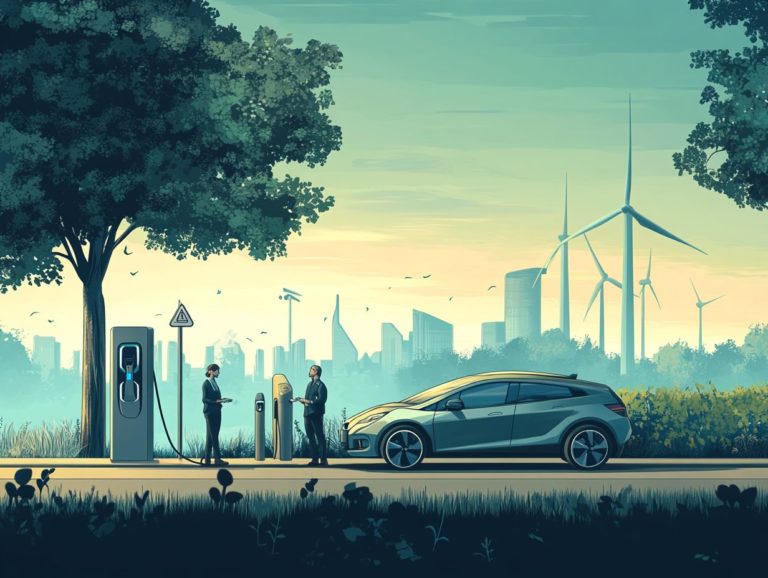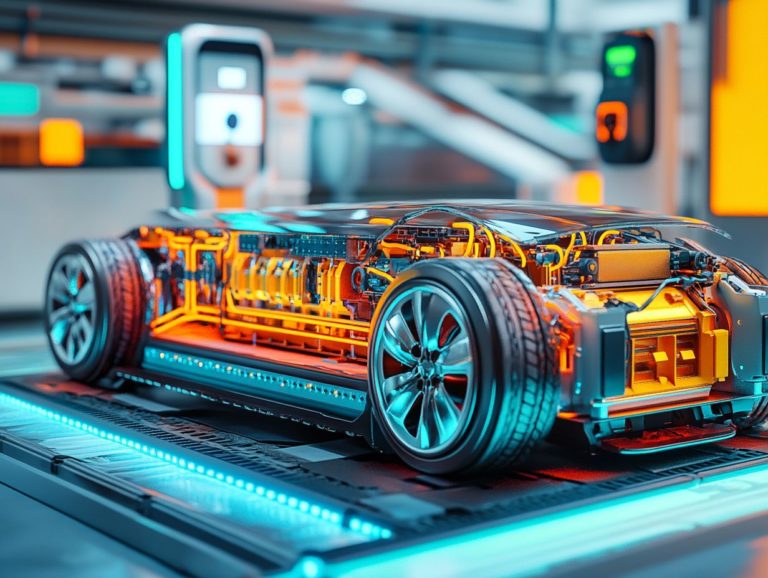The Future of Electric Trucks: Industry Insights
The electric truck industry is on the brink of an exciting transformation, ready for significant growth and innovation. As businesses increasingly seek sustainable solutions, electric trucks present compelling advantages, including environmental benefits and cost savings.
The journey presents challenges, including infrastructure limitations and regulatory hurdles that must be navigated. This article delves into the current landscape of electric trucks, showcasing ongoing technological advancements and analyzing their potential impact on the trucking industry.
Engage with us as we unravel the promising future of transportation.
Contents
- Key Takeaways:
- Overview of the Electric Truck Industry
- Advantages of Electric Trucks
- Challenges and Roadblocks for Electric Trucks
- Innovations and Developments in Electric Truck Technology
- Impact of Electric Trucks on the Trucking Industry
- Frequently Asked Questions
- Curious about electric trucks? Here s how they differ from traditional trucks.
- What are the benefits of electric trucks for the industry?
- What are the current challenges facing the adoption of electric trucks in the industry?
- How do electric trucks contribute to a greener future?
- What are some key trends and developments in the electric truck industry?
- Will electric trucks replace traditional trucks in the future?
Key Takeaways:
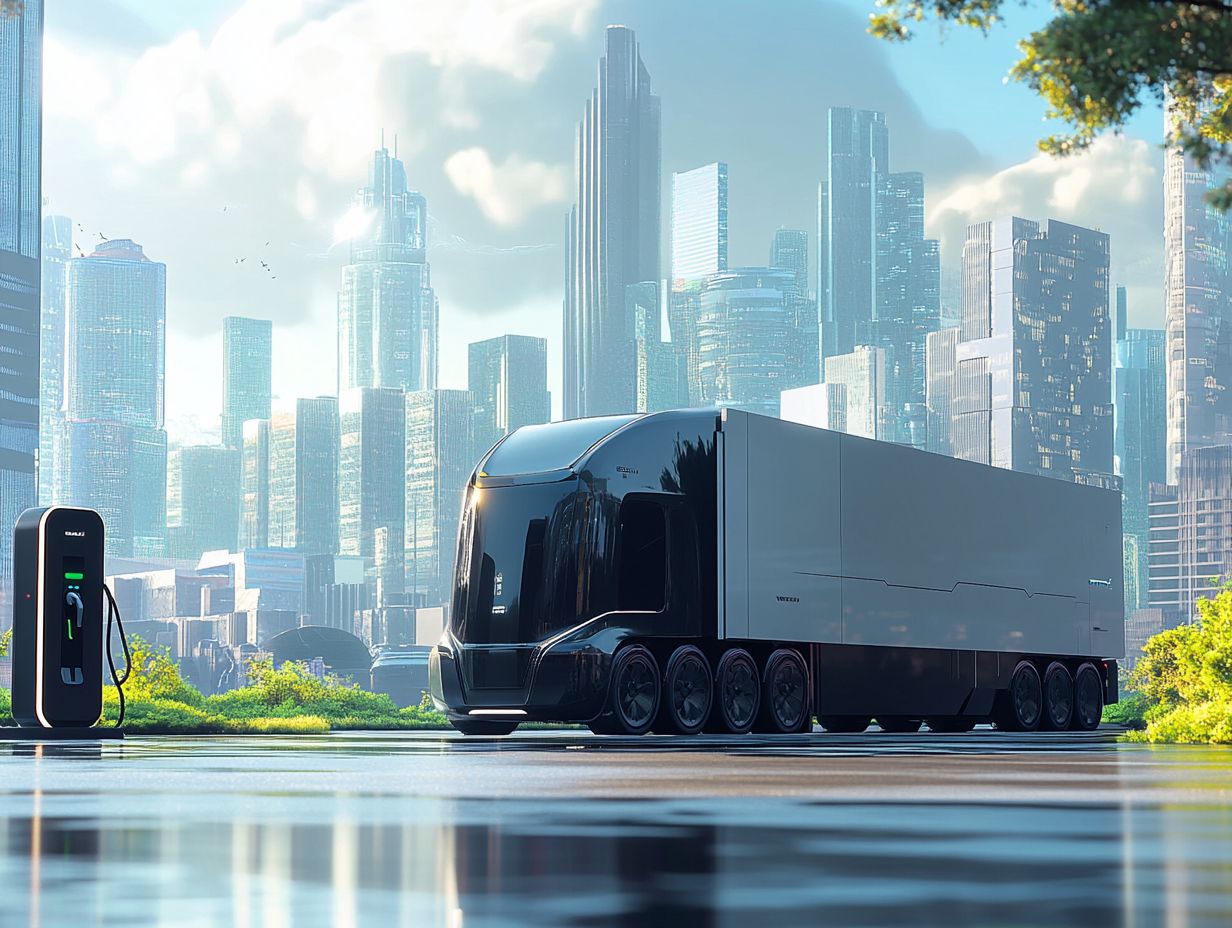
- Electric trucks offer significant environmental benefits, cost savings, and efficiency compared to traditional diesel trucks.
- Infrastructure and range limitations, as well as regulatory hurdles, remain key challenges for the widespread adoption of electric trucks.
- Rapid advancements in battery technology and the integration of autonomous driving features are paving the way for a promising future in the trucking industry.
Overview of the Electric Truck Industry
The electric truck industry is undergoing a remarkable transformation, propelled by market trends that emphasize environmental sustainability and a significant reduction in carbon emissions compared to traditional diesel vehicles.
This evolution is fueled by cutting-edge advancements in electric vehicle technology, along with increasing investments from trucking companies and delivery services eager to embrace electric solutions.
Federal regulations designed to promote clean heavy-duty vehicles and strategic infrastructure investments further enhance the growth of the electric truck market, creating an enticing landscape for the adoption of electric trucks in the transportation sector.
Current State and Growth Projections
The electric truck market is currently experiencing strong growth expectations, signaling a noteworthy shift in the logistics sector towards electric vehicles. This transformation is largely driven by advancements in lithium batteries and the emergence of innovative electric vehicle manufacturers.
Recent statistics reveal that electric trucks now comprise over 10% of total truck sales, with expectations for market penetration to double by 2025. Analysts foresee that this trend will persist, projecting that by 2030, electric vehicles could represent nearly 30% of the truck market.
However, challenges such as supply chain disruptions and rising production costs present significant hurdles for manufacturers. Case studies from industry leaders like Ford Motor Company, with its all-electric F-150 Lightning, and Rivian showcasing its impressive R1T, demonstrate how these companies strategically navigate obstacles while reinforcing their commitment to sustainable transport solutions.
Advantages of Electric Trucks
Electric trucks present a wealth of advantages over their diesel counterparts, particularly when it comes to environmental sustainability and cost savings. These factors considerably boost operational efficiency.
By utilizing electric motors and regenerative braking systems, these vehicles alleviate operational challenges and meet the rising emissions standards. This compliance translates into public health benefits, significantly reducing harmful carbon emissions in both urban and rural settings.
Environmental Benefits
The environmental benefits of electric trucks are remarkable, especially in dramatically reducing carbon emissions and fostering the widespread adoption of emission-free vehicles in the transportation sector.
These vehicles play a crucial role in enhancing air quality by significantly reducing pollutants that contribute to respiratory problems and environmental degradation.
Research from the International Council on Clean Transportation has demonstrated that electric trucks can slash greenhouse gas emissions by as much as 90% compared to their diesel counterparts. With zero tailpipe emissions, integrating these trucks into logistics and freight operations aligns the industry with sustainability goals and paves the way for a cleaner, more efficient future in heavy-duty transportation.
Cost Savings and Efficiency
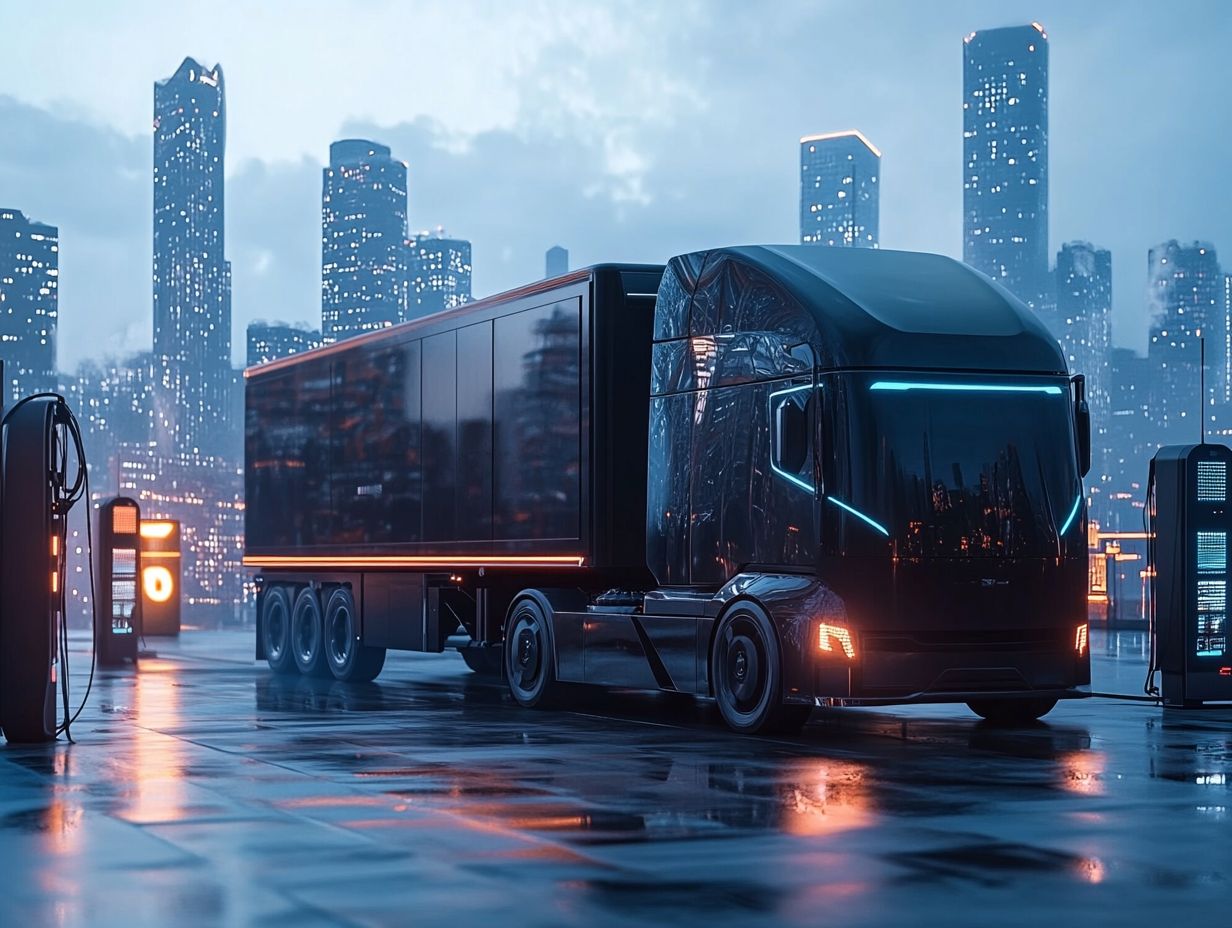
Electric trucks provide significant cost savings and better efficiency. They lead to lower maintenance costs and improved energy use, boosting your productivity.
These vehicles cut fuel costs by using electricity, which is generally cheaper than diesel. They also reduce wear and tear on components, resulting in longer service intervals. Organizations that embrace this technology often report savings ranging from thousands to potentially millions over time, especially when fuel prices fluctuate.
Transitioning to electric trucks helps you avoid emissions-related penalties, giving your company a competitive edge while contributing to sustainability goals. By adopting electric vehicles, you ll enjoy smoother operations with reduced downtime and improved routing efficiency.
Challenges and Roadblocks for Electric Trucks
While electric trucks offer myriad benefits, you ll face exciting challenges that can hinder their widespread adoption. Issues like insufficient infrastructure, limited range, and regulatory hurdles can significantly impact how well your business runs.
Addressing these obstacles is crucial for unlocking the full potential of electric trucks in the transportation landscape.
Infrastructure and Range Limitations
A major barrier to adopting electric trucks is the lack of adequate charging infrastructure and the inherent range limitations affecting your operations in logistics.
In key markets like California, where the push for sustainable transport is strong, the charging network still falls behind the growing demand for electric trucks. This shortfall creates a challenge for logistics companies like yours, as you strive to balance efficiency with sustainability. Limited charging stations can lead to longer wait times and potential delays in delivery routes.
Considering the average range of electric trucks typically falls short of their diesel counterparts, it’s essential to examine how these constraints impact route optimization and layover strategies.
To tackle these challenges, innovative solutions are emerging, such as fast-charging technology and strategic partnerships aimed at expanding the charging infrastructure. Investing in battery swapping stations places where you can quickly replace a depleted battery with a fully charged one and mobile charging units could significantly alleviate range anxiety and enhance your operational efficiency.
Regulatory Hurdles
Regulatory hurdles present a formidable challenge in the electric truck market, as federal regulations and emissions standards introduce complexities that can significantly impact the adoption of electric trucks across the industry.
Government initiatives like the Inflation Reduction Act and the Infrastructure Investment and Jobs Act play crucial roles in shaping this market landscape. By offering financial incentives and funding for sustainable technologies, these policies aim to ease some barriers, encouraging manufacturers to invest in electric trucks.
However, overly stringent regulations could stifle growth, creating costs that may be difficult for smaller companies to bear. As you navigate this intricate regulatory environment, striking a balance between essential oversight and fostering innovation will be vital for achieving overall success in the sector.
Innovations and Developments in Electric Truck Technology
Innovations in electric truck technology are transforming the industry. With remarkable advancements in battery technology and electric vehicle systems, the shift toward more efficient and cost-effective production methods for autonomous trucks is well underway.
Embrace this evolution, as it sets the stage for a future where sustainability and performance go hand in hand.
Consider transitioning to electric trucks today to experience these benefits and stay ahead in the competitive landscape!
Battery Technology Advancements
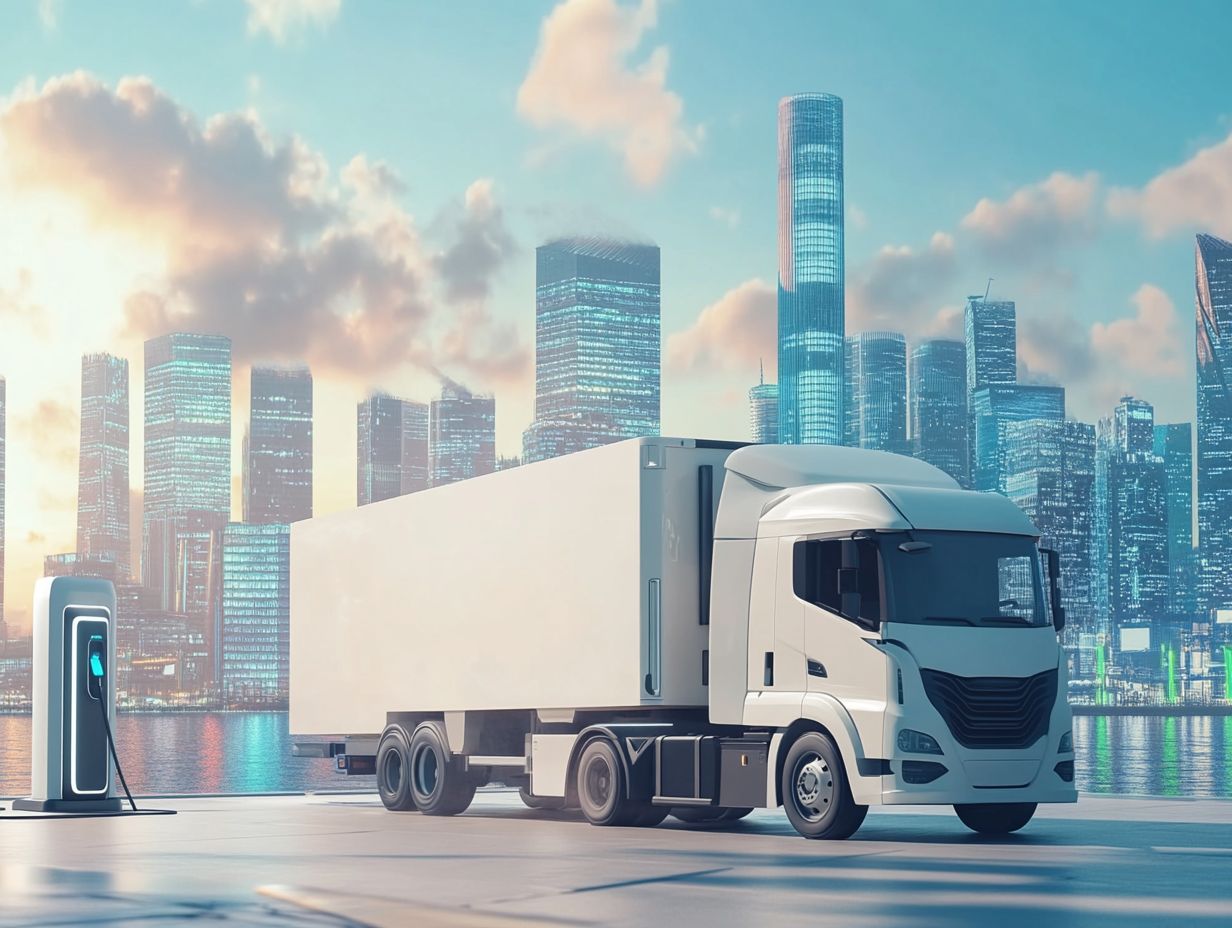
Battery technology is advancing rapidly. Lithium batteries, with better energy storage, are making electric trucks more viable in today s market.
These innovations allow electric trucks to achieve significantly longer ranges on a single charge. They also reduce manufacturing costs, making them more accessible for logistics companies. Major players like Tesla, Rivian, and CATL are leading the charge with breakthroughs that enhance both charging speed and capacity, catering to the industry’s demand for efficiency.
Logistics firms are excited to adopt these game-changing electric vehicles! They can enjoy reduced operational costs, a lower environmental footprint, and improved delivery timelines. This shift will revolutionize supply chain dynamics.
Autonomous Driving Features
The integration of autonomous driving features in electric trucks is a remarkable leap in electric vehicle technology. It is designed to boost performance and optimize transportation routes.
This advancement promises to reshape logistics by significantly cutting fuel costs and reducing human error on the roads. Autonomous trucks navigating complex traffic may elevate safety standards and decrease accident rates linked to human drivers.
Transitioning to these technologies comes with challenges, such as workforce displacement and the need for regulatory updates. As electric vehicle technology evolves, improvements in battery range and charging infrastructure are pivotal. This supports the feasibility of autonomous systems in various freight applications.
Impact of Electric Trucks on the Trucking Industry
The adoption of electric trucks will reshape the trucking industry, impacting the job market and transforming supply chain dynamics.
As you embrace this shift, expect to see productivity gains ripple throughout the sector. This marks a new era of efficiency and sustainability.
Changes in Job Market and Supply Chain
The shift towards electric truck adoption is reshaping the job market and the supply chain in trucking. Companies must adapt to innovative technologies and changing operational demands.
This evolution brings significant changes in job roles, requiring traditional positions to adopt new skill sets, especially in software management and electric vehicle maintenance. Companies are becoming aware of potential skill gaps and are investing in workforce training programs to equip employees with essential competencies.
The integration of electric trucks tackles pressing environmental concerns and enhances efficiency, reducing operational costs. Government initiatives promote sustainable technologies and boost training and development efforts, ensuring a smoother transition for the workforce.
Frequently Asked Questions
Curious about electric trucks? Here s how they differ from traditional trucks.
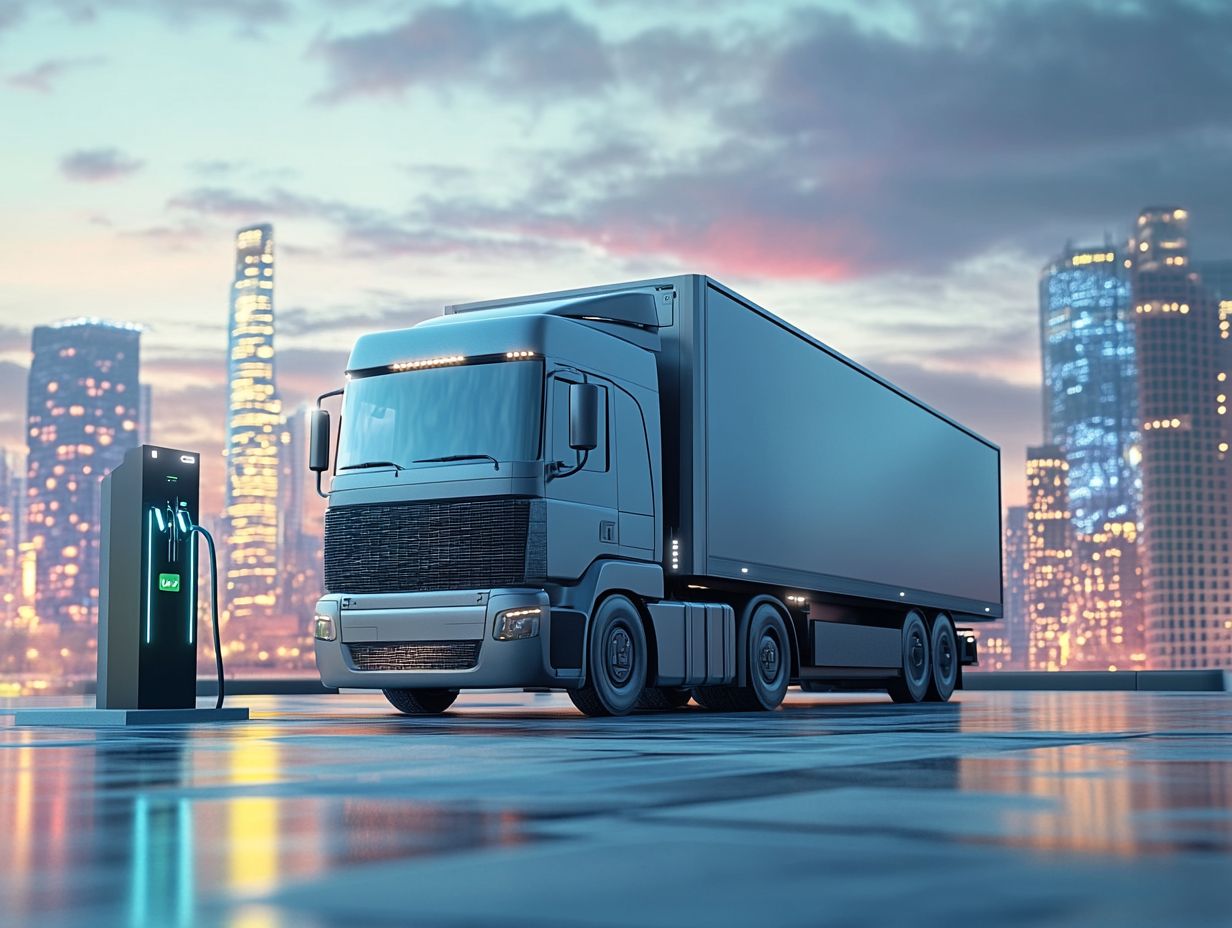
Electric trucks run on electricity, not gasoline or diesel. They use batteries to store energy and run on electric motors, meaning they don t pollute like traditional trucks.
To learn more about the benefits of electric trucks, explore our resources!
What are the benefits of electric trucks for the industry?
Electric trucks provide several benefits. They lower operating costs by reducing fuel and maintenance expenses.
These vehicles support environmental sustainability and enhance overall efficiency.
They also create new job opportunities in manufacturing and maintaining electric components.
What are the current challenges facing the adoption of electric trucks in the industry?
High upfront costs are a significant challenge for companies considering electric trucks. Range limitations and long charging times can also impact productivity.
Without enough charging stations, using electric trucks for long trips can be difficult.
How do electric trucks contribute to a greener future?
Electric trucks produce zero exhaust emissions, which helps reduce air pollution. They can use renewable energy sources, decreasing our reliance on fossil fuels.
What are some key trends and developments in the electric truck industry?
The electric truck industry is evolving rapidly. Major manufacturers are investing in new models and technologies.
Key trends include larger electric trucks, autonomous driving features, and improved battery technology.
Will electric trucks replace traditional trucks in the future?
Electric trucks might soon take over traditional trucks! As technology advances, we can expect this exciting shift.
The transition will depend on infrastructure development and government policies.

